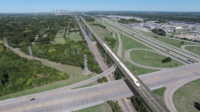The U.K. government in late February announced a plan for an estimated $52-billion project to extend the country's only high-speed railroad northward to Birmingham and beyond. It aims to start construction of the line, dubbed HS2, later this decade, and hopes to see trains start running by 2026.
“Countries across Europe and Asia are already pressing ahead with ambitious plans for high-speed rail,” said Transport Secretary Philip Hammond, launching the five-month public information process. “We cannot afford to be left behind.”
In a first phase of the proposed Y-shaped system, the line would be extended from London by 225 km to Birmingham in central England. A second phase, to be completed by 2032 or 2033, would take the lines to Manchester and Leeds. The government estimates HS2 would cut train travel times between London and Manchester, currently at roughly two hours, to just 80 minutes.
HS2 would link with the existing London-Channel Tunnel high-speed line and also with London’s Heathrow Airport. The Dept. for Transport claims HS2 would generate total benefits with a net present value exceeding $70 billion over 60 years.
“Delivering [the project] still demands the very strongest commitment going forwards, both politically and financially,” says Tom Foulkes, director general of the Institution of Civil Engineers.
“The government must commit to the full network, which links London and Birmingham to Leeds and Manchester, and connects to international gateways,” adds John Cridland, director general of the Confederation of British Industry, which represents large corporations.
However, HS2 is not without its critics. Matthew Sinclair, director of the Taxpayers’ Alliance, a group promoting lower taxes, claims the project is too costly. “There are more affordable ways of getting the capacity needed,” he says.
Green Party leader Caroline Lucas also questions the business case for HS2, as well as the government’s projections of resulting greenhouse gas reductions. “And the huge damage which would be caused to local communities and their environment would be unsustainable,” she adds.



Post a comment to this article
Report Abusive Comment